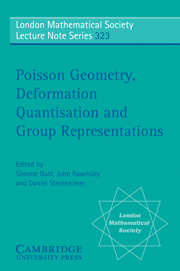Book contents
- Frontmatter
- Contents
- Preface
- Part One Poisson geometry and morita equivalence
- Part Two Formality and star products
- Part Three Lie groupoids, sheaves and cohomology
- 1 Introduction
- 2 Lie groupoids
- 3 Sheaves on Lie groupoids
- 4 Sheaf cohomology
- 5 Compactly supported cohomology
- Bibliography
- Part Four Geometric methods in representation theory
- Part Five Deformation theory: a powerful tool in physics modelling
- Index
4 - Sheaf cohomology
Published online by Cambridge University Press: 04 August 2010
- Frontmatter
- Contents
- Preface
- Part One Poisson geometry and morita equivalence
- Part Two Formality and star products
- Part Three Lie groupoids, sheaves and cohomology
- 1 Introduction
- 2 Lie groupoids
- 3 Sheaves on Lie groupoids
- 4 Sheaf cohomology
- 5 Compactly supported cohomology
- Bibliography
- Part Four Geometric methods in representation theory
- Part Five Deformation theory: a powerful tool in physics modelling
- Index
Summary
In this chapter we have attempted to give a systematic treatment of sheaf cohomology for étale groupoids. This cohomology applies in particular to Lie groupoids for which there are ‘enough’ equivariant sheaves. It is possible to give a more precise formulation of this property (in the style of Tannaka duality), but we will refrain from doing that here. We only observe that the class of Lie groupoids having enough equivariant sheaves is closed under weak equivalence (cf. Section 3.2), and includes étale (and foliation) groupoids (cf. Section 2.3).
In the context of foliations, the sheaf cohomology of étale groupoids was described in concrete terms by Haefliger [24]. His approach was based on the bar resolution, to be explained in Section 4.2 of this chapter. It is possible to approach the cohomology from a Grothendieck style point of view, using derived categories and derived functors. The latter approach has the advantage that many general properties such as functoriality, Morita invariance, duality, etc., will be easily derivable. Early references for the treatment of cohomology of étale groupoids along these lines and for the relation to the bar complex include [43, 58].
In Section 4.5 we will show how to describe the cohomology of such étale groupoids in terms of the much easier cohomology of small categories. More precisely, one can associate to each étale groupoid G a small discrete category Emb(G), and prove an isomorphism of the form H*(G,A)=H*(Emb(G),A), under suitable conditions (Theorem 4.21). This result was first proved in [44] and later in somewhat more general form in [16].
- Type
- Chapter
- Information
- Publisher: Cambridge University PressPrint publication year: 2005

